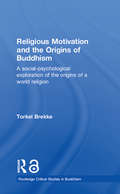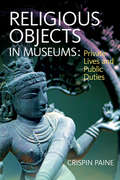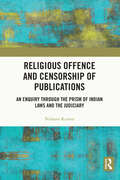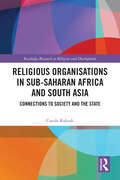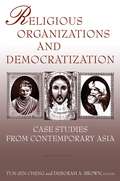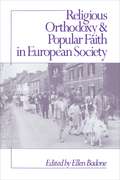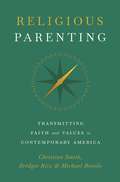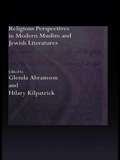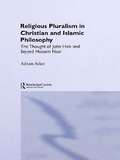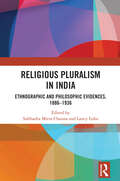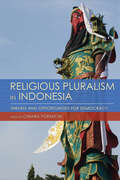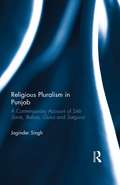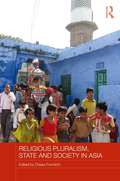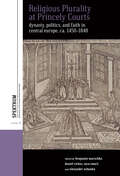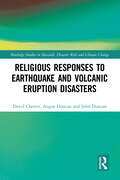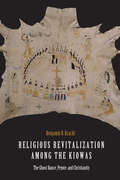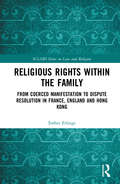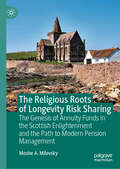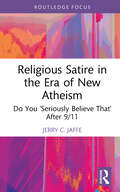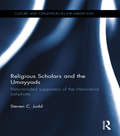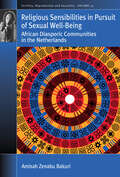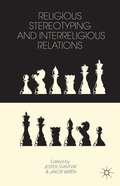- Table View
- List View
Religious Motivation and the Origins of Buddhism: A Social-Psychological Exploration of the Origins of a World Religion (Routledge Critical Studies in Buddhism #Vol. 25)
by Torkel BrekkeWhy did people in North India from the 5th century BC choose to leave the world and join the sect of the Buddha? This is the first book to apply the insights of social psychology in order to understand the religious motivation of the people who constituted the early Buddhist community. It also addresses the more general and theoretically controversial question of how world religions come into being, by focusing on the conversion process of the individual believer.
Religious Networks in the Roman Empire
by Anna CollarThe first three centuries AD saw the spread of new religious ideas through the Roman Empire, crossing a vast and diverse geographical, social and cultural space. In this innovative study, Anna Collar explores both how this happened and why. Drawing on research in the sociology and anthropology of religion, physics and computer science, Collar explores the relationship between social networks and religious transmission to explore why some religious movements succeed, while others, seemingly equally successful at a certain time, ultimately fail. Using extensive epigraphic data, Collar provides new interpretations of the diffusion of ideas across the social networks of the Jewish Diaspora and the cults of Jupiter Dolichenus and Theos Hypsistos, and in turn offers important reappraisals of the spread of religious innovations in the Roman Empire. This study will be a valuable resource for students and scholars of ancient history, archaeology, ancient religion and network theory.
Religious Objects in Museums: Private Lives and Public Duties
by Crispin PaineIn the past, museums often changed the meaning of icons or statues of deities from sacred to aesthetic, or used them to declare the superiority of Western society, or simply as cultural and historical evidence. The last generation has seen faith groups demanding to control 'their' objects, and curators recognising that objects can only be understood within their original religious context. In recent years there has been an explosion of interest in the role religion plays in museums, with major exhibitions highlighting the religious as well as the historical nature of objects.Using examples from all over the world, Religious Objects in Museums is the first book to examine how religious objects are transformed when they enter the museum, and how they affect curators and visitors. It examines the full range of meanings that religious objects may bear - as scientific specimen, sacred icon, work of art, or historical record. Showing how objects may be used to argue a point, tell a story or promote a cause, may be worshipped, ignored, or seen as dangerous or unlucky, this highly accessible book is an essential introduction to the subject.
Religious Offence and Censorship of Publications: An Enquiry through the Prism of Indian Laws and the Judiciary
by Nishant KumarThis book analyzes the role of laws and the judiciary in the process of censorship in India. It examines the rationales and observations produced by the judiciary when demands for censorship are directed against publications that allegedly offend religious sentiments. Focusing on a micro-level analysis of censorship of publications, it presents a hard case to understand the limitations of freedom of expression and the role played by the judiciary in defining its boundaries. The volume traces the evolution of laws governing freedom of expression since the colonial period and the context in which these laws were amended after Independence. It also explicates how the legal process – the structural and functional aspects of working of judiciary – affects the fate of freedom of expression in India. Employing comparative legal analysis, it tries to understand and situate the Indian case within the larger discourse of censorship and freedom of expression around the world, thereby marking its similarities and differences. In unravelling the politics of censorship, the author also examines the interaction among different stakeholders like government, non-state actors and the judiciary. A tract for our times, this book will be of great interest to scholars and researchers of law, especially constitutional law and fundamental rights, politics, especially political theory and Indian politics, modern India and South Asian studies.
Religious Organisations in Sub-Saharan Africa and South Asia: Connections to Society and the State (Routledge Research in Religion and Development)
by Carole RakodiThis book explores the links between religion, states, social welfare and social change in Sub-Saharan Africa and South Asia. Building on the author’s previous analysis of how religious beliefs, practices and values influence social behaviour and relationships, especially within families, this book focuses on the organisational characteristics of religions and societies. The book considers how Muslim, Christian, Hindu and Buddhist organisations working in different contexts express the religious values of charity and compassion in practical activities to improve social welfare. Drawing on extensive empirical research, the book maps the organisations involved, identifying the factors that explain their choice of activities, sources of funding and modes of organisation, and highlighting similarities and differences between the religious traditions. It considers the involvement of religious actors in school-level education, as well as in international humanitarian relief and reconstruction, and addresses the claim that religious organisations have distinctive features that give them comparative advantages. Finally, the book reviews research on the roles of religious values and organisations in resisting or promoting social change, focusing on women’s movements, especially their campaigns for changes in family law, and the quest for social and legal recognition for sexual and gender minorities. The book’s wide coverage of two subcontinents in the Global South and several important religious traditions will be of interest to researchers and students in the fields of sociology, international development, religious studies, anthropology and area studies, as well as to those engaged in policy and action who are looking to improve their understanding of the complex social, cultural, political and religious contexts in which they work.
Religious Organizations and Democratization: Case Studies from Contemporary Asia
by Tun-jen Cheng Deborah A. BrownSince the terrorist attacks on 9/11, the political roles of religious institutions and groups have captured inernational attention. This book examines how religious institutions and organizations in various Asian countries are influencing democratic development and the shaping of government policies. Religious Organizations and Democratization covers Taiwan, Hong Kong, Mainland China, Korea, Thailand, the Philippines, Malaysia, Indonesia, and Japan. The chapters specifically address the engagement of Christian, Buddhist, Muslim, and other religious organizations in the advancement and/or hindrance of democratization in the region. The contributors consider such questions as: Why have some religious organizations played a decisive role in democratic transitions, while others remained politically dormant, and other still acted in conservative alliances to block democratic development? Why did some religious organizations that once were active and instrumental to democratic change lose their political vitality as soon as civil liberties were successfully introduced? And why did other religious organizations, irrespective of their roles in the process of democratic transition, emerge as key political forces in the civil society?
Religious Orthodoxy and Popular Faith in European Society
by Ellen BadoneBy examining the ongoing tension between popular and official religion in Europe, this collection of essays contributes significantly to the continuing effort to understand the religious experience of ordinary people. Ranging from the Mediterranean to northern Europe and including both Roman Catholic and Eastern Orthodox traditions, the ethnographic contexts evoked in these essays enable us to see people actively and creatively shaping their religious domain, sometimes in collaboration with official ritual specialists, often in open rebellion against them. The use of folklore texts and extensive narrative quotations, combined with an approach highlighting key symbols such as pilgrimages and festas, provides a common theoretical orientation throughout the bookone that considers how religious discourses are formed by social disciplines and relationships of power and subordination. This volume includes "Spirits and the Spirit of Capitalism" by Jane Schneider, "The Priest and His People: The Contractual Basis for Religious Practice in Rural Portugal" by Caroline B. Brettell, "The Struggle for the Church: Popular Anticlericalism and Religiosity in Post-Franco Spain" by Ruth Behar, "Pilgrimage and Popular Religion at a Greek Holy Shrine" by Jill Dubisch, "Breton Folklore of Anticlericalism" by Ellen Badone, "Stories of Power, Powerful Stories: The Drunken Priest in Donegal" by Lawrence J. Taylor, and "Reflections on the Study of Religious Orthodoxy and Popular Faith in Europe" by Stanley Brandes.
Religious Parenting: Transmitting Faith and Values in Contemporary America
by Christian SmithHow parents approach the task of passing on religious faith and practice to their childrenHow do American parents pass their religion on to their children? At a time of overall decline of traditional religion and an increased interest in personal “spirituality,” Religious Parenting investigates the ways that parents transmit religious beliefs, values, and practices to their kids. We know that parents are the most important influence on their children’s religious lives, yet parents have been virtually ignored in previous work on religious socialization. Renowned religion scholar Christian Smith and his collaborators Bridget Ritz and Michael Rotolo explore American parents’ strategies, experiences, beliefs, and anxieties regarding religious transmission through hundreds of in-depth interviews that span religious traditions, social classes, and family types all around the country.Throughout we hear the voices of evangelical, Catholic, Mormon, mainline and black Protestant, Jewish, Muslim, Hindu, and Buddhist parents and discover that, despite massive diversity, American parents share a nearly identical approach to socializing their children religiously. For almost all, religion is important for the foundation it provides for becoming one’s best self on life’s difficult journey. Religion is primarily a resource for navigating the challenges of this life, not preparing for an afterlife. Parents view it as their job, not religious professionals’, to ground their children in life-enhancing religious values that provide resilience, morality, and a sense of purpose. Challenging longstanding sociological and anthropological assumptions about culture, the authors demonstrate that parents of highly dissimilar backgrounds share the same “cultural models” when passing on religion to their children.Taking an extensive look into questions of religious practice and childrearing, Religious Parenting uncovers parents’ real-life challenges while breaking innovative theoretical ground.
Religious Perspectives in Modern Muslim and Jewish Literatures (Routledge Studies in Middle Eastern Literatures #Vol. 8)
by Glenda Abramson Hilary KilpatrickThis collection brings together discussions of the way in which Muslim and Jewish beliefs and practices are represented in modern literary texts of poetry, fiction and drama. The chapters collected here consider elements of the expression of Judaism and Islam in modern literature. Key topics such as religious ideas and teachings, aspects of mysticism, the tenets of religion, uses made of sacred texts, religion and popular culture and reflections of religious controversies are covered. While there is an embodied comparative element to the chapters, the essays are not confined by comparisons and cover a wide range of the literary expression of religious issues.
Religious Pluralism and Values in the Public Sphere
by Lenn E. GoodmanHow can we, as people and communities with different religions and cultures, live together with integrity? Does tolerance require us to deny our deep differences or give up all claims to truth, to trade our received traditions for skepticism or relativism? Cultural philosopher Lenn E. Goodman argues that we can respect one another and learn from one another's ways without either sharing them or relinquishing our own. He argues that our commitments to our own ideals and norms need not mean dogmatism or intolerance. In this study, Goodman offers a trenchant critique of John Rawls's pervasive claim that religious and metaphysical voices must be silenced in the core political deliberations of a democracy. Inquiry, dialogue, and open debate remain the safeguards of public and personal sanity, and any of us, Goodman illustrates, can learn from one another's traditions and explorations without abandoning our own.
Religious Pluralism in Christian and Islamic Philosophy: The Thought of John Hick and Seyyed Hossein Nasr
by Adnan AslanThe philosophy of religion and theology are related to the culture in which they have developed. These disciplines provide a source of values and vision to the cultures of which they are part, while at the same time they are delimited and defined by their cultures.This book compares the ideas of two contemporary philosophers, John Hick and Seyyed Hossein Nasr, on the issues of religion, religions, the concept of the ultimate reality, and the notion of sacred knowledge.On a broader level, it compares two world-views: the one formed by Western Christian culture, which is religious in intention but secular in essence; the other Islamic, formed through the assimilation of traditional wisdom, which is turned against the norms of secular culture and is thus religious both in intention and essence.
Religious Pluralism in India: Ethnographic and Philosophic Evidences, 1886-1936
by Subhadra Mitra Channa Lancy LoboThis volume explores the inherent pluralism of Hinduism through ethnographic and philosophical evidence as presented in the Journal of Anthropological Society of Bombay. The essays dated 1886–1936 represent a period that marked the emergence of a European-educated native intelligentsia with a rationalist outlook. The chapters cover a wide range of topics from Tree Worship in Mohenjo Daro, the origin of the Hindu Trimurti, interpretation of Avestic and Vedic Texts, to the second set of more localized chapters that cover the Muhammadan Castes of Bengal, the Tenets and Practices of a Certain Class of Faqirs in Bengal, the Theoretical History of the Goddess Yellamma, and much more. Written during a particular historical as well as intellectual period that reflected certain key patterns – a period just following the Bengal Renaissance of the nineteenth century that ushered in the ideologies of a reformative Hinduism – this volume highlights how religions of all denominations have influenced each other and appear to have mingled beliefs and practices from multiple sources. It shows how tolerance and inclusiveness along with syncretism have been part of India’s religious and social history. This book will be of interest to students and researchers of religions, history, anthropology, sociology, political science, and sociology of religion. It will also be useful to those interested in inter-religious dialogues and civil society.
Religious Pluralism in Indonesia: Threats and Opportunities for Democracy (Cornell Modern Indonesia Project)
In 1945, Sukarno declared that the new Indonesian republic would be grounded on monotheism, while also insisting that the new nation would protect diverse religious practice. The essays in Religious Pluralism in Indonesia explore how the state, civil society groups, and individual Indonesians have experienced the attempted integration of minority and majority religious practices and faiths across the archipelagic state over the more than half century since Pancasila. The chapters in Religious Pluralism in Indonesia offer analyses of contemporary phenomena and events; the changing legal and social status of certain minority groups; inter-faith relations; and the role of Islam in Indonesia's foreign policy. Amidst infringements of human rights, officially recognized minorities—Protestants, Catholics, Hindus, Buddhists and Confucians—have had occasional success advocating for their rights through the Pancasila framework. Others, from Ahmadi and Shi'i groups to atheists and followers of new religious groups, have been left without safeguards, demonstrating the weakness of Indonesia's institutionalized "pluralism."Contributors: Lorraine Aragon, Christopher Duncan, Kikue Hamayotsu, Robert Hefner, James Hoesterey, Sidney Jones, Mona Lohanda, Michele Picard, Evi Sutrisno, Silvia Vignato
Religious Pluralism in Punjab: A Contemporary Account of Sikh Sants, Babas, Gurus and Satgurus
by Joginder SinghThis book analyses the heterogeneous modes of meditation, prayer, initiation, beliefs and practices, codes of conduct, ethics and life-style of the contemporary Sikh Sants, Babas, Gurus and Satgurus in Punjab.
Religious Pluralism, State and Society in Asia: Religious Pluralism, State And Society In Asia (Routledge Religion in Contemporary Asia Series)
by Chiara FormichiTaking a critical approach to the concept of ‘religious pluralism’, this book examines the dynamics of religious co-existence in Asia as they are directly addressed by governments, or indirectly managed by groups and individuals. It looks at the quality of relations that emerge in encounters among people of different religious traditions or among people who hold different visions within the same tradition. Chapters focus in particular on the places of everyday religious diversity in Asian societies in order to explore how religious groups have confronted new situations of religious diversity. The book goes on to explore the conditions under which active religious pluralism emerges (or not) from material contexts of diversity.
Religious Plurality at Princely Courts: Dynasty, Politics, and Confession in Central Europe, ca. 1555-1860 (Spektrum: Publications of the German Studies Association #30)
by Benjamin Marschke, Daniel Riches, Alexander Schunka, and Sara SmartEarly modern European monarchies legitimized their rule through dynasty and religion, and ideally the divine right of the ruler corresponded with the confession of the territory. It has thus been assumed that at princely courts only a single confession was present. However, the reality of the confessional circumstances at court commonly involved more than one faith. Religious Plurality at Princely Courts explores the reverberations of biconfessional or multiconfessional intra-Christian situations at courts on dynastic, symbolic, diplomatic, artistic, and theological levels, exploring interreligious dialogue, religious change, and confessional blending. Incorporating perspectives across European studies such as domestic and international politics, dynastic strategies, the history of ideas, women’s and gender history, as well as visual and material culture, the contributions to this volume highlight the dynamics and implications of religious plurality at court.
Religious Practice and Democracy in India
by Pradeep K. Chhibber Sandeep ShastriThis book demonstrates the close relationship between religion and democracy in India. Religious practice creates ties among citizens that can generate positive and democratic political outcomes. In pursuing this line of inquiry the book questions a dominant strand in some contemporary social sciences - that a religious denomination (Catholic, Hindu, Muslim, Sikh, and so on) is sufficient to explain the relationship between religion and politics or that religion and democracy are antithetical to each other. The book makes a strong case for studying religious practice and placing that practice in the panoply of other social practices and showing that religious practice is positively associated with democracy.
Religious Responses to Earthquake and Volcanic Eruption Disasters (Routledge Studies in Hazards, Disaster Risk and Climate Change)
by John Duncan Angus Duncan David ChesterThis book argues that, although secular and religious perspectives on disasters have often conflicted, today there are grounds for believing that the world’s major faiths have much to contribute to the processes of post-disaster recovery and future disaster risk reduction (DRR).It seeks to demonstrate how contemporary dialogues between theologians, disaster scholars and policymakers are defining new ways of working together. These explore how the resources of religious communities, e.g. buildings, human resources and finance, may be used to foster successful policies of DRR, particularly in the aftermath of earthquakes and volcanic eruptions. Musing on the relationships between religion and disasters has occurred for millennia and has affected many societies worldwide. In societies where the world’s major religions – Buddhism, Christianity, Hinduism, Islam, Judaism and Shinto – have been and remain dominant, attempting to find supernatural explanations for disasters has occurred throughout history and there have been many theologies seeking to explain why people suffer losses. It is argued that developments both within these traditions of faith and in how disasters are understood by the hazard research community of researchers and planners have allowed a new modus vivendi to emerge which emphasises both a recognition of religious worldviews by academic writers and disaster planners on the one hand, and a desire by people of faith and their leaders to be more fully committed to the goals of DRR.The book will appeal to those who are interested in the interface between disasters and theology across the principal religions of the world. This includes researchers and students in geology, geography, theology and religious studies. It will also be useful for specialist academic audience and the educated general reader.
Religious Revitalization among the Kiowas: The Ghost Dance, Peyote, and Christianity
by Benjamin R. KrachtFramed by theories of syncretism and revitalization, Religious Revitalization among the Kiowas examines changes in Kiowa belief and ritual in the final decades of the nineteenth century. During the height of the horse-and-bison culture, Kiowa beliefs were founded in the notion of daudau, a force permeating the universe that was accessible through vision quests. Following the end of the Southern Plains wars in 1875, the Kiowas were confined within the boundaries of the Kiowa-Comanche-Apache (Plains Apache) Reservation. As wards of the government, they witnessed the extinction of the bison herds, which led to the collapse of the Sun Dance by 1890. Though prophet movements in the 1880s had failed to restore the bison, other religions emerged to fill the void left by the loss of the Sun Dance. Kiowas now sought daudau through the Ghost Dance, Christianity, and the Peyote religion. Religious Revitalization among the Kiowas examines the historical and sociocultural conditions that spawned the new religions that arrived in Kiowa country at the end of the nineteenth century, as well as Native and non-Native reactions to them. A thorough examination of these sources reveals how resilient and adaptable the Kiowas were in the face of cultural genocide between 1883 and 1933. Although the prophet movements and the Ghost Dance were short-lived, Christianity and the Native American Church have persevered into the twenty-first century. Benjamin R. Kracht shows how Kiowa traditions and spirituality were amalgamated into the new religions, creating a distinctive Kiowa identity.
Religious Rights within the Family: From Coerced Manifestation to Dispute Resolution in France, England and Hong Kong (ICLARS Series on Law and Religion)
by Esther ErlingsIt is often asserted that ‘A family that prays together, stays together’. But what if a child no longer wishes to pray? This book analyses the law in relation to situations where parents force their children to manifest the parental religion. From thorough examination of international law it argues that, unlike what is generally believed, the human rights regime does not grant parents a right to impose manifestations of their religion on their children. Instead, the author proposes to regard coerced manifestations as a limitation on children’s right to freedom of manifestation, based on national laws that give parents rights at the domestic level under principles such as parental responsibility. The book focuses on two aspects of States’ positive obligations in this regard. First, the obligation to provide a regulatory framework that can protect children’s right to freedom of manifestation, and restricts limitations to those that are proportionate or 'necessary in a democratic society'. Second, to provide access to remedies, which it is argued should consist of access to a family-friendly infrastructure for dispute resolution available to parents and children in conflict over religious manifestation. Both depend heavily on the way States balance power between parents and children at the national level. The book includes three case studies and social research of jurisdictions that offer different perspectives under the principles of parental authority (France), parental responsibility (England) and parental rights (Hong Kong).
The Religious Roots of Longevity Risk Sharing: The Genesis of Annuity Funds in the Scottish Enlightenment and the Path to Modern Pension Management
by Moshe A. MilevskyThis book presents a unique historical study on the origins of longevity risk management and its links to religious institutions in the eighteenth century. Throughout history, monarchs, affluent patrons, and wealthy benefactors routinely pledged to provide their devotees with pensions or life annuities, mirroring the biblical concept of ‘daily bread for life’. Until the eighteenth century, however, the uncertainty around the longevity of beneficiaries’ lives and the difficulty of budgeting for random financial obligations had posed economic challenges that often led to insufficient funding and high default rates. This book narrates the genesis of longevity risk pooling and the first successfully funded annuity scheme in history, an eventual prototype for national pension plans around the world. It examines how a group of Protestant clergymen, scientists, and intellectuals associated with the Presbyterian Church of Scotland pioneered innovative methods for setting up a reversionary annuity and widow’s pension plan, guided by actuarial principles. Unknown to many, the economist Adam Smith, and other literati of the Scottish Enlightenment, invested in this novel annuity. Illuminating the social and theological contexts of this scheme, the book argues that religious belief played a critical role in the development of best practices around the prudent management of longevity risk. The practices, values and beliefs in divine probabilities were at the heart of these thought leaders’ confidence in long-term financial projections. Shedding light on this fascinating aspect of actuarial history by an examination of the archival records, while also linking to contextual discussions of modern pension challenges, this book will be of interest to scholars and readers interested in finance, insurance, pensions, and religion.
Religious Satire in the Era of New Atheism: Do You ‘Seriously Believe That’ After 9/11 (The Cultural Politics of Media and Popular Culture)
by Jerry C. JaffeReligious Satire in the Era of New Atheism presents a contemporary account of religious satire as evidenced by the modern art of stand-up comedy.Focused on the context of the post-9/11 American culture phenomenon, sometimes referred to as the New Atheism – as embodied by public intellectuals such as Christopher Hitchens, Sam Harris, and Richard Dawkins – it documents the rise of comedic satire in relation to evangelical beliefs and religious dogma. Drawing on the author’s own experience of stand-up performance, it examines the comedy of figures such as Mark Maron, Bill Maher, and Ricky Gervais and presents material from interviews with comedians including Lewis Black, John Fugelsang, and Leigh Ann Lord to provide unique insights into some of the issues and definitions surrounding satire.With attention to the demonstrable rise in religious satire following the events of September 11, 2001, the author considers the clear link between this increase and the New Atheist movement, exploring shared themes and presence at specific events, such that stand-up comedy represents the Avant Garde of the New Atheists.
Religious Scholars and the Umayyads: Piety-Minded Supporters of the Marwanid Caliphate (Culture and Civilization in the Middle East)
by Steven JuddReligious Scholars and the Umayyads analyzes legal and theological developments during the Marwānid period (64/684--132/750), focusing on religious scholars who supported the Umayyads. Their scholarly network extended across several generations and significantly influenced the development of the Islamic faith. Umayyad qādòīs, who represented the intersection of religious authority and imperial power, were particularly important. This book challenges the long-standing paradigm that the emerging Muslim faith was shaped by religious dissenters who were hostile to the Umayyads. A prosopographical analysis of Umayyad-era scholars demonstrates that piety and opposition were not necessarily synonymous. Reputable scholars served as qādòīs, tutors and advisors to Umayyad caliphs and governors. Their religious credentials were untarnished by their association with the Umayyads and they appear prominently in later hòadīth collections and fiqh works. This historiographical study demonstrates that excessive reliance on al-Tòabarī’s chronicle has distorted the image of the Umayyads. Alternatively, biographical sources produced by later hòadīth scholars reveal a rich tradition of Umayyad-era religious scholarship that undermines al-Tòabarī’s assumptions. Offering a better understanding of early Islamic religious development, this book is a valuable resource for students and researchers in the fields of Islamic history, Islamic legal studies and Arabic historiography.
Religious Sensibilities in Pursuit of Sexual Well-Being: African Diasporic Communities in the Netherlands (Fertility, Reproduction and Sexuality: Social and Cultural Perspectives #55)
by Amisah Zenabu BakuriThe self-identifying Ghanaian-Dutch and Somali-Dutch communities residing in the Randstad area of the Netherlands are deeply impacted by religious beliefs and cultural factors in their approach towards sexual health practices, well-being and pleasure. This book shows how religious sensibilities shape the physical activities, beauty practices, and gendered roles that are adopted into the daily lives of these communities in pursuit of their sexual and general well-being. Through an ethnographic account, it explores and challenges the assumptions held around the complex relationship between religion and sexuality.
Religious Stereotyping and Interreligious Relations
by Jesper Svartvik Jakob WirénReligion can heal, but it can hurt as well. This collection of essays addresses some key issues of religious stereotyping, prejudice, and discrimination, and considers a wide range of important topics which haunt our societies today. When stereotyping becomes the oxygen we inhale, when it is so important to us that we cannot see how we can survive without it - what can and should we do? Twenty-two scholars from Australia, Europe, the Middle East and North America explore the anatomy of various forms of stereotyping and ways to oppose them.
